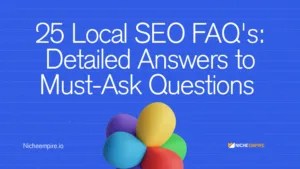Did you know SEO delivers a jaw-dropping ROI of 1,389%? far surpassing PPC (36%), social media (182%), and webinars (430%). This isn’t just a statistic for real estate – it’s a wake-up call. Ranking higher on search engines means attracting motivated real estate brokers and vendors, securing deals faster, and outpacing your competition.
This guide will explore dynamic, proven real estate SEO strategies to help real estate investors dominate organic search and turn your website into a lead-generating powerhouse.
What is SEO for Real Estate Investors all About?
SEO for real estate investors involves optimizing your website to increase its visibility in search engine results, helping you attract motivated real estate sellers, buyers, and investors. This entails optimizing on-page SEO factors like keyword-rich content, compelling meta descriptions, and well-structured URLs to enhance search engine optimization.
Off-page SEO, such as building quality backlinks from relevant websites and leveraging digital PR to build your brand, further builds your site’s authority and rankings.
Additionally, technical SEO strategies like improving page speed, mobile responsiveness, and user experience (UX) ensure visitors stay longer and engage more. These positive UX signals can influence your search rankings for your real estate investor website. With effective SEO, real estate investors can generate organic traffic, increase leads, and close more deals without relying on expensive paid ads.
Top SEO Strategies for Real Estate Investors
Conduct a Real Estate SEO Audit
A comprehensive technical SEO audit is essential for any real estate investor who wants to improve their site’s search rankings; this audit assesses the health of your real estate website and provides a roadmap for improvement. It should cover several aspects of your site:
- Content Quality: Ensure your content is original, valuable, and aligned with the keyword search intent your target audience is searching for. High-quality content is crucial for both SEO and user engagement.
- Technical SEO: Check your real estate investor website’s loading speed, mobile compatibility, and search engine indexing. According to Google, 53% of mobile users abandon a site if it takes longer than three seconds to load. Your website’s speed can drastically impact conversion rates and why it’s imperative that you optimize for speed.
- Local SEO for Real Estate: Local audit and optimization is critical for real estate investors. Ensuring that your Google Business Profile (formerly, Google My Business) is updated and accurate helps your site appear in local searches, increasing visibility for property buyers and sellers in your area.
- On-page SEO: Examine the structure of your website, including headings, meta descriptions, and internal linking, following best practices for search engine optimization. Having these SEO elements correctly set up ensures your site is ready for search engine crawling.
- Off-page SEO: Review your social media presence, backlinks, and online mentions to improve your overall link-building strategy. Backlinks from reputable websites, such as local directories or real estate blogs, help boost your website’s authority and improve search rankings.
Regular SEO audits should be conducted at least twice a year to identify areas for improvement and track progress over time.
On this blog post you will learn how to do SEO audits.
Optimize Your Performance
Site speed is essential for user experience and SEO rankings, particularly for real estate investors. Google favors fast-loading websites, and research shows that even a one-second delay can significantly impact conversions. BigCommerce reported that a one-second delay in page load time can result in a 7% drop in conversions and an 11% decrease in page views.
For real estate investors, slow websites can drive potential clients away, leading to missed opportunities in lead generation and lower search rankings. To optimize your site’s speed, consider reducing file sizes, enabling browser caching, and minimizing large images to enhance user experience and improve search engine optimization, thereby increasing traffic to your website.
Prioritize Mobile Optimization
Over 60% of all web searches now come from mobile devices, making mobile optimization a crucial part of any SEO strategy. Google uses mobile-first indexing, meaning it ranks websites based on their mobile version instead of the desktop version. You could lose valuable traffic and rankings if your real estate investor website isn’t mobile-friendly.
To enhance mobile optimization, ensure your website has a responsive design that adapts to different screen sizes. Make sure buttons are easy to click, forms are mobile-friendly, and navigation is simple. Google reports that even a one-second delay in mobile page load time can reduce conversions by up to 20%, impacting your site’s traffic and users experience.
Optimize Your Real Estate Site’s Images
Real estate websites often showcase high-quality property images, so optimizing these visuals can significantly power up your SEO strategy. Google Image Search is a popular tool for users searching for properties, so making your images more discoverable is essential. To do this, include relevant keywords in the image file names, use descriptive alt text, and add captions to provide context.
Optimizing images not only helps with your site’s SEO but also improves user experience. Well-optimized, fast-loading images make your website more accessible and engaging. This leads to better user interaction, higher search rankings, and improved search traffic for your target keywords from image packs and image search results.
Create Content Tailored to Specific Locations
Location-focused content is essential for real estate investors looking to capture the attention of buyers and sellers searching for properties in specific neighborhoods, cities, or regions, aligning with their search intent. By providing in-depth local market insights, detailed neighborhood guides, and tailored investment strategies, you can engage your target audience and establish yourself as a trusted authority in the real estate market.
With over 1.5 billion “near me” searches happening each month, keyword research becomes essential for targeting local real estate keywords relevant to your business. Integrating location-based long-tail keywords such as “homes for sale in Phoenix,” “real estate investment in Scottsdale,” or “best properties in Midwest” can significantly enhance your SEO strategy. This targeted approach improves your online visibility and positions you as a trusted brand in your real estate community.
Create valuable Real Estate Resources
Providing valuable tools and resources is a great way to improve SEO. Real estate investors can enhance their websites by offering helpful features like mortgage calculators, home-selling checklists, and neighborhood guides. These resources make it easier for visitors to find the information they need while also improving your website’s SEO by increasing user engagement and time spent on your site. By providing valuable and informative content, you build trust with your audience and strengthen your online presence, which is crucial for lead generation in the real estate business.
List Your Business on Google and Local Directories
A crucial aspect of local SEO for real estate is claiming and optimizing your Google Business Profile. This listing is important for real estate investors, as it places your business directly on Google Search and Google Maps.
In addition to Google, list your business on other relevant local directories like Yelp, Zillow, Realtor.com, and Yellow Pages. Ensure that your Name, Address, Phone number, and Website (NAPW) are consistent across all platforms to enhance your search engine optimization efforts.
This consistency helps Google trust your business and improves your local search rankings, which will help your real estate business increase leads from local SEO.
Create High-Quality Backlinks
Backlinks are key to SEO success, especially from relevant and high-authority sites linking with your target real estate SEO keywords. The more high-quality backlinks you have, the more authority Google assigns to your website, ultimately driving traffic to your website. However, quality matters more than quantity. Google values relevant and trustworthy backlinks over many low-quality links, emphasizing the importance of quality in link building.
As a real estate investor, focus on earning backlinks from industry-specific websites, local publications, and real estate blogs. Links from reputable local news outlets or recognized industry experts can enhance your real estate investor website’s credibility and influence your SEO rankings.
Build Relationships with Potential Customers
SEO for real estate investors has evolved; it’s more building a brand than ever. One way to achieve this is by establishing a good relationship with your audience. Engaging with your audience goes beyond transactions—it’s about creating lasting connections. You can engage your customers by responding quickly to inquiries and comments on your website and social media. This shows that you value your audience’s time and are committed to providing valuable information.
Offering tailored solutions based on a customer’s needs fosters trust and loyalty. By consistently engaging them through your blog posts, newsletters, and social media updates, you keep your audience informed and encourage return visits to your site, driving engaged traffic, an SEO UX (User Experience) factor.
Sharing real estate tips, property market insights, and neighborhood information that align with your audience’s interests yields positive engagement and attracts motivated home seller and buyer leads.
Set Realistic SEO Goals and Measure Progress
Setting realistic SEO goals is vital for the success of your real estate SEO strategy. These goals should align with your overall business objectives and guide your SEO efforts toward achieving measurable results.
While striving for high search engine rankings is important, setting effective SEO goals goes beyond this. It involves understanding your target audience’s behavior—what they search for and how they interact with your content. You can tailor your website to deliver value and meet their specific needs by identifying these insights.
For real estate investors, SEO success should be defined by clear, actionable goals. These might include improving real estate keyword rankings for high-intent search terms like “sell my house fast” or “cash home buyers in New York.” This increases organic site traffic and, ultimately, generates quality leads. The goal is always to close more deals and get higher ROI from your SEO strategy; each step in your real estate investor’s SEO strategy should contribute to this outcome.
To track progress, focus on KPIs reflecting your SEO performance, such as search volume and conversion rates from lead generation efforts. Key metrics include impressions, clicks, traffic, leads, backlinks, and user engagement statistics. To track your progress, pay attention to:
- Impressions: Impressions measure how often your website appears in search results and can be tracked using Google Search Console. This metric gives insight into your site’s visibility, even if users don’t click. Increasing impressions indicates growing real estate investor website exposure to your target audience.
- Clicks: Clicks represent the number of users who visit your website directly from search engine results. As your rankings improve, you should see the number of clicks rise. Tracking clicks helps you gauge how effective your content and meta descriptions are in attracting users.
- Traffic: Traffic measures the volume of visitors to your site, and tools like Google Analytics make it easy to monitor. Organic traffic growth shows that your SEO efforts drive more people to your website. Over time, this increase translates into more opportunities to generate leads and close deals.
- Leads: For real estate investors, increasing leads from local SEO is the lifeblood of success. When users fill out forms, request property evaluations, or contact you after visiting your site, leads are generated.
- Conversions: The ultimate measure of ROI is the number of deals you close from organic leads. By tracking which deals result from SEO-driven traffic, you can directly connect your efforts to revenue. This validates your strategy and helps refine your approach for better results.
To monitor these metrics, use powerful SEO tools like Google Analytics. These tools offer invaluable insights into site performance, keyword rankings, and user behavior, helping you adjust your SEO strategy for optimal results.
By setting clear, realistic SEO goals that align with your business objectives and target audience, you can ensure that your SEO efforts are strategically focused on driving sustainable growth and success.
Final Insights – Ultimate SEO Strategies for Real Estate Investors
SEO is essential for real estate investors aiming to increase leads from local SEO and close more deals. You can improve your rankings and build trust with your audience by focusing on key strategies such as SEO audits, optimizing site speed, and creating location-specific content. Achieving SEO success requires continuous effort, attention to user experience, strategic relationship-building, and effective internal and external linking. Stay dedicated, track your progress, and fine-tune your approach to achieve long-term growth and success in real estate investing.
Found this post help? We have similar posts you will enjoy:
- Real Estate SEO Guide for Beginners
- Best Real Estate Keywords You Must Use on Your Website
- Local SEO for Real Estate Businesses
Frequently Asked Questions
1. What is SEO for real estate investors?
SEO for real estate investors refers to optimizing a realtor’s website to improve its visibility on search engines like Google. This includes tactics such as optimizing content with relevant keywords, improving site speed, enhancing user experience, and acquiring quality backlinks. For real estate investors, the goal is to attract motivated buyers, sellers, and investors by ranking higher in search results, ultimately leading to more leads and closed deals.
2. Why is local SEO important for real estate investors?
Local SEO for real estate is crucial for real estate investors because it helps your business show up in local search results when potential clients search for properties or real estate services in your area. Optimizing for local search, including claiming and optimizing your Google Business Profile and using location-specific keywords, increases your chances of being found by local buyers and sellers, ultimately leading to more qualified leads and opportunities.
3. How can I improve my real estate website’s loading speed?
To improve your real estate website’s loading speed, you can reduce the size of images and files, enable browser caching, convert to “.webp” image format, and use tools like Google PageSpeed Insights to identify image optimization opportunities. Fast loading speeds enhance user experience and positively impact your SEO rankings, as Google rewards faster sites with good user experience with higher search ranking in search results.
4. What are high-quality backlinks, and how do they help real estate SEO?
High-quality backlinks are links from other authoritative and relevant websites that point to your real estate site. They are a major ranking factor for Google. For real estate investors, acquiring backlinks from trusted sources like local news outlets, industry-specific blogs, or real estate directories can increase your website’s authority, improve its SEO rankings, and drive more organic traffic to your site.



